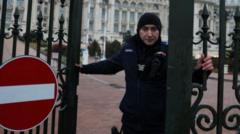Romania's landscape of politics took a dramatic turn as the country’s constitutional court annulled the first round of the recent presidential election, citing allegations of Russian interference. This unprecedented ruling follows intense political fluctuations over the past two weeks and has left many citizens grappling with the implications of such a decision.
The atmosphere in Bucharest, while quiet at first, is charged with apprehension. Citizens are reflecting on the court's bold ruling and what it means for their democratic process. Central to the controversy are intelligence documents declassified by the outgoing president, which detail an extensive online campaign purportedly orchestrated by a "state-sponsored actor" to benefit fringe candidate Calin Georgescu. Additional reports documented attempts to hack local electoral websites, which were traced back to cyber-crime individuals operating out of Russia.
As Romanians connect the dots, Moscow is widely blamed for the unrest, which evokes troubling memories of the communist regime. At a recent rally, attendees expressed fears that Russian involvement could unravel the democratic progress made since the fall of communism. One concerned citizen recounted past experiences under oppressive rule, revealing an urgent desire to escape the country if there were indications of a shift away from European values and liberties.
Meanwhile, Georgescu's political platform has raised eyebrows—his propositions to halt military assistance to Ukraine and his disparaging remarks about NATO have drawn speculation about his alignment with Russian interests. Despite this scrutiny, Georgescu himself dismissed any allegations of external manipulation, instead attributing his rise in popularity to the resonance of his "Romania First" narrative among the populace.
An exploration of social media reveals that while Georgescu's online presence has been robust, particularly on platforms like TikTok, there has been little acknowledgment of support for him among the general public, apart from his immediate circle. His message, emphasizing sovereignty, religious values, and a fight against the established political machine, holds potential appeal in a country that may lean toward cultural conservatism.
With the electoral rerun potentially scheduled for the spring, the nation's political landscape could evolve dramatically in that time frame. The question arises: how will Georgescu’s supporters respond to claims of Russian influence, and will they remain passive or mobilize in protest? In the interim, calls for calm dominate public discourse as Romania navigates a precarious chapter in its democracy.



















